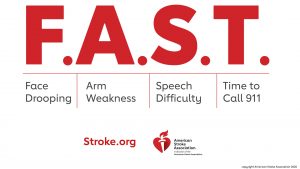
For World Stroke Day on Oct. 29, the American Stroke Association, a division of the American Heart Association, invites people to learn how to spot the stroke warning signs with F.A.S.T. and how stroke survivors can prevent a recurrent stroke.
F.A.S.T. stands for:
-
- Face Drooping – Does one side of the face droop or is it numb? Ask the person to smile. Is the person’s smile uneven?
- Arm Weakness – Is one arm weak or numb? Ask the person to raise both arms. Does one arm drift downward?
- Speech Difficulty – Is speech slurred? Is the person unable to speak or hard to understand? Ask the person to repeat a simple sentence, like “The sky is blue.”
- Time to Call 9-1-1 – If someone shows any of these symptoms, even if the symptoms go away, call 9-1-1 and get to a hospital immediately.
A stroke happens when normal blood flow in the brain is interrupted. When parts of the brain don’t get the oxygen-rich blood they need, those cells die. Early treatment leads to higher chances of survival and helps reduce disability.
A large majority of strokes can be prevented through education and lifestyle changes such as moving more, eating smart and managing your blood pressure.
For more information about stroke, including risk factors and prevention, visitwww.stroke.org.
